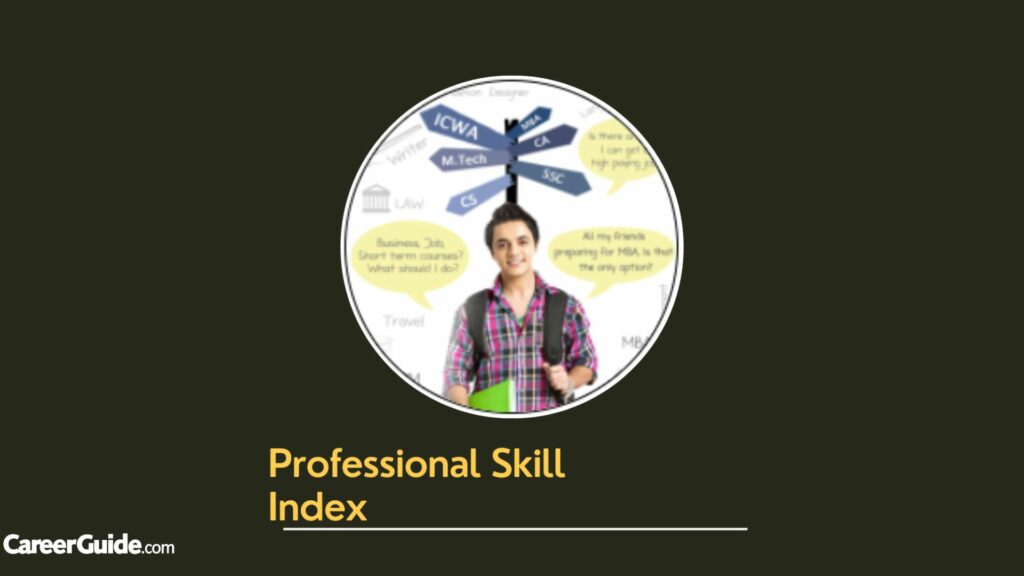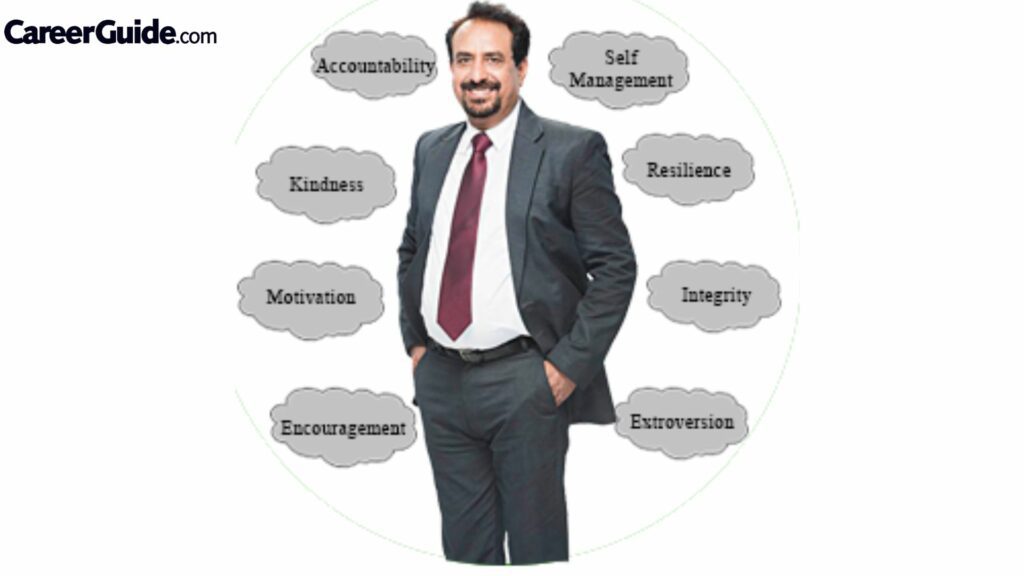When we discuss the parameters on this psychometric test, these parameters are something that is required to be present in a person who opts for this profession as a career. Being a teacher just not mean to transfer the knowledge to the students, because in this fast-paced world students can gain knowledge from various other means also but the requirement of the teacher arises when we need to someone to shape the child with knowledge as well as values and helps the child to grow as a person. Here’s another encounter with educator’s professional skill index.
As we know, every person has a unique set of traits and abilities and they differ from one another in terms of their personality. This means some may score high, some medium and some low. But, this does not mean that the person should not think of pursuing this career, this test basically helps the individual to develop an understanding about themself and to know the various areas of strength which can act as a reason to go ahead with the career.
Ideal Career Test
The Ideal Career Test is a comprehensive assessment tool designed to assist individuals in identifying suitable career paths that align with their interests, skills, values, and personality traits. This test aims to provide valuable insights into the types of occupations and work environments that would be a good fit for an individual, helping them make informed decisions about their career choices.
The test begins by evaluating an individual’s interests and passions. It explores their preferences for various activities, hobbies, and subjects. This assessment helps identify areas that genuinely captivate the individual and can guide them towards career paths that align with their personal interests.
The assessment also evaluates an individual’s skills and aptitudes. It explores their strengths in different areas such as problem-solving, communication, creativity, leadership, and technical abilities. By understanding their skill set, individuals can identify careers that allow them to leverage their natural talents and develop their potential.
Another essential aspect of the Ideal Career Test is the evaluation of an individual’s values and work preferences. It explores their desired work-life balance, preferred work environment, level of independence, and desire for social interaction. Understanding these factors helps individuals find careers that match their values and provide a satisfying work experience.
Personality traits are also a crucial part of the assessment. The test explores an individual’s personality dimensions, such as extroversion/introversion, openness to new experiences, conscientiousness, emotional stability, and agreeableness. By considering their personality profile, individuals can identify careers that align with their temperament and work styles, as well as occupations that provide a conducive environment for personal growth and job satisfaction.
After completing the Ideal Career Test, individuals receive a detailed report outlining their interests, skills, values, personality traits, and recommended career paths. This report serves as a valuable resource for making informed decisions about career choices, setting realistic goals, and pursuing further education or training.
Professional Skill Index
The Professional Skill Index (PSI) is a comprehensive assessment tool designed to evaluate and measure an individual’s professional skills across various dimensions. It provides a comprehensive overview of an individual’s strengths, areas for improvement, and potential areas of professional growth. The PSI is a valuable resource for individuals seeking to understand and enhance their skillset in order to excel in their careers.
The PSI evaluates a wide range of professional skills that are highly valued in the workplace. These skills may include communication, problem-solving, teamwork, leadership, adaptability, time management, critical thinking, creativity, emotional intelligence, and technological proficiency, among others. By assessing these skills, the PSI provides individuals with a clear understanding of their current skill level in each area.
The assessment process involves a combination of self-assessment and objective evaluation. Individuals may provide self-ratings for each skill, reflecting their perception of their own abilities. Additionally, feedback from peers, supervisors, or mentors may be collected to provide a more comprehensive and balanced assessment of an individual’s skills.
The PSI provides individuals with a detailed report that outlines their skill strengths and areas for improvement. This report may include suggestions for development opportunities, such as training programs, workshops, or mentorship. The PSI helps individuals prioritize their skill enhancement efforts and create a plan for professional growth.
Employers and organizations also find the PSI valuable for talent development and succession planning. By assessing the professional skills of their employees, employers can identify skill gaps within their workforce and design targeted training programs or reassign individuals to roles that align better with their strengths. The PSI enables organizations to optimize their talent pool and foster a culture of continuous learning and development.
Educator Professional Skills
Educator professional skills encompass a wide range of competencies and abilities that are crucial for effective teaching and student engagement. These skills go beyond subject matter expertise and play a vital role in creating a positive and impactful learning environment. Here is an overview of some key professional skills that educators should possess:
- Pedagogical Expertise: Educators should have a deep understanding of teaching methods, curriculum development, and assessment strategies. They should be skilled in designing engaging and effective lesson plans that cater to diverse learning styles and abilities.
- Communication Skills: Clear and effective communication is essential for educators to convey information, facilitate discussions, and provide feedback. Strong verbal and written communication skills help educators engage with students, parents, and colleagues effectively.
- Classroom Management: Educators need to create a well-managed and organized classroom environment that promotes discipline, respect, and a positive learning atmosphere. Effective classroom management skills enable educators to establish routines, manage student behavior, and address conflicts constructively.
- Differentiation: Educators should be adept at differentiating instruction to meet the individual needs of students. This involves adapting teaching methods, materials, and assessments to accommodate diverse learning styles, abilities, and backgrounds.
- Technology Integration: Proficiency in leveraging technology tools and resources is becoming increasingly important in education. Educators should be skilled in integrating technology into their teaching practices to enhance student learning, engagement, and digital literacy.
- Collaboration and Teamwork: Educators often work collaboratively with colleagues, administrators, and other stakeholders. Strong collaboration skills enable educators to participate in professional learning communities, contribute to team efforts, and effectively communicate with colleagues and parents.
- Cultural Competence: In diverse classrooms, educators need to exhibit cultural competence by understanding and valuing the backgrounds, experiences, and perspectives of their students. This skill helps create an inclusive and respectful learning environment that celebrates diversity.
- Continuous Learning: Educators should be committed to lifelong learning and professional development. They should engage in ongoing professional growth, stay updated with research and best practices in education, and seek opportunities for self-improvement.
Skill Based Career Test
A skill-based career test is a specialized assessment tool designed to help individuals identify career paths that align with their unique skills and abilities. This type of test focuses on evaluating an individual’s specific skill set, providing valuable insights into potential career options where those skills can be effectively applied.
The test begins by assessing a wide range of skills that are relevant to various professions and industries. These may include technical skills, such as programming, data analysis, or engineering, as well as soft skills, such as communication, problem-solving, leadership, or creativity. The assessment provides individuals with a comprehensive understanding of their skill strengths and areas for further development.
Based on the results of the assessment, the test generates a detailed report outlining potential career paths that match the individual’s skill profile. The report may provide information on industries, job roles, and specific occupations that require or value the assessed skills. This guidance helps individuals explore career options that are aligned with their natural aptitudes, maximizing their potential for success and job satisfaction.
Furthermore, the test may also provide recommendations for skill development or training opportunities to enhance existing skills or acquire new ones. This allows individuals to proactively pursue professional development activities that align with their career goals and enhance their marketability in their chosen field.
The skill-based career test is a valuable tool for individuals at various stages of their career journey. It can assist high school students in selecting educational paths that align with their skills, guide college students in choosing a major or specialization, and aid professionals in exploring career transitions or advancement opportunities.
It is important to note that the skill-based career test should be considered as one component of the career exploration process. It should be used in conjunction with personal introspection, research, and guidance from career counselors or mentors. Additionally, the test results should be evaluated alongside individual interests, values, and long-term career goals to make well-informed decisions.
FAQ About Another encounter with Educator's professional skill Index
Another encounter with Educator’s professional skill index is a blog post on the CareerGuide website that discusses the importance of educators having a strong understanding of their own strengths and weaknesses. The post argues that by understanding their own skills and abilities, educators can better develop their teaching methods and improve their students’ learning outcomes.
- Improved teaching performance: When educators understand their own strengths and weaknesses, they can better tailor their teaching methods to their students’ needs. This can lead to improved student learning outcomes.
- Increased job satisfaction: Educators who are confident in their skills and abilities are more likely to be satisfied with their jobs.
- Reduced stress and burnout: When educators know their own strengths and weaknesses, they are less likely to feel overwhelmed or stressed by their work.
Any educator who is interested in improving their teaching skills or who is looking for ways to reduce stress and burnout should read another encounter with Educator’s professional skill index. The post provides valuable insights into the importance of self-awareness for educators and offers practical tips for developing a strong understanding of one’s own strengths and weaknesses.
- he post was written by a career counselor with over 20 years of experience in the education field.
- The post is based on the latest research on the importance of self-awareness for educators.
- The post includes a number of practical tips for developing a strong understanding of one’s own strengths and weaknesses.












